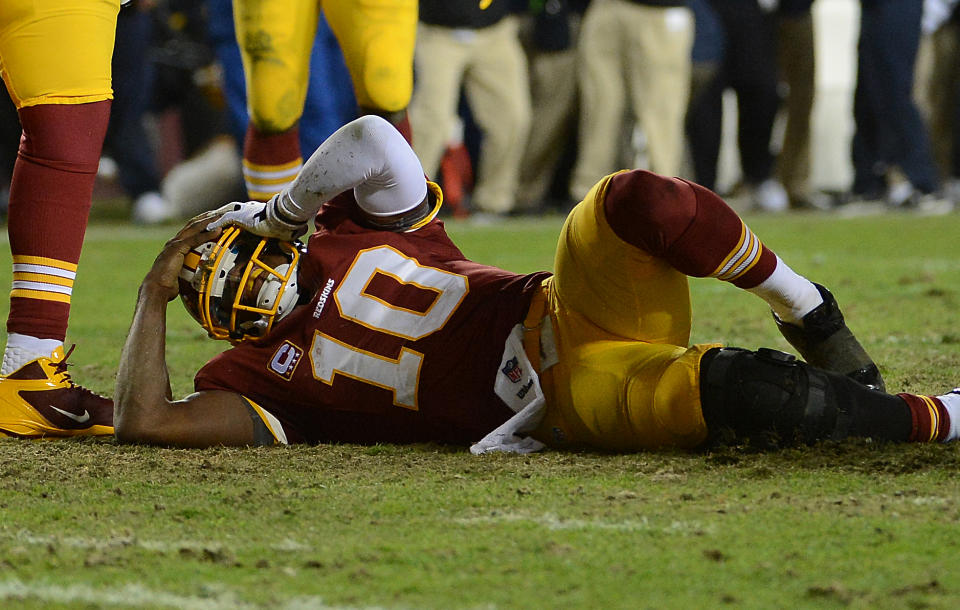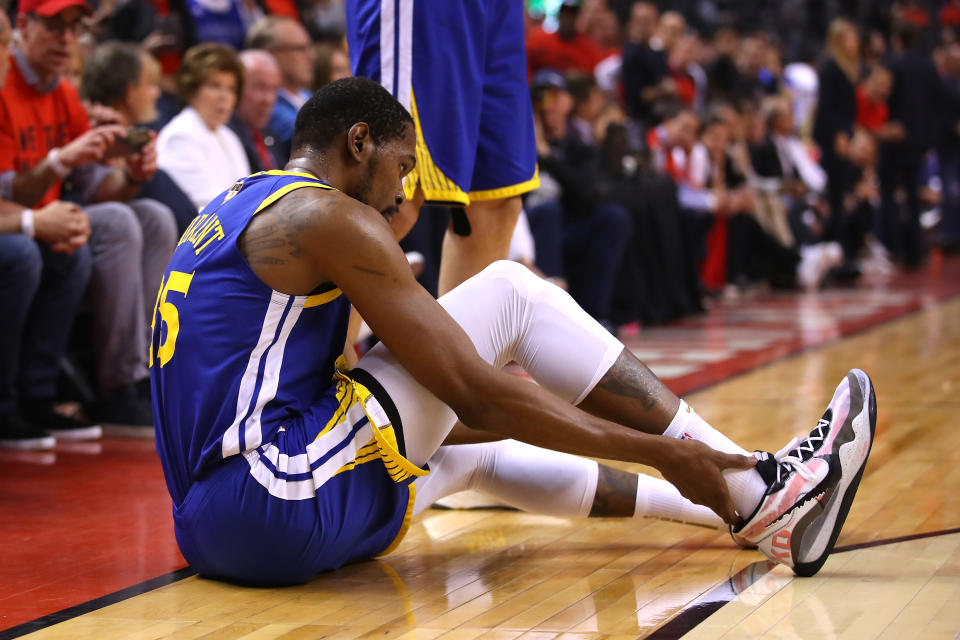The Kevin Durant lesson: 'Laying it on the line' is a costly relic in sports
ALAMEDA, Calif. – Kevin Durant laid it on the line.
This is how some within the NFL made sense of what happened to the NBA superstar on Monday night, when his ill-fated Finals return ended in a manner that conjures nightmares for most professional athletes. Like most fans in the Bay Area, Oakland Raiders coach Jon Gruden was watching when the Golden State Warriors star injured his Achilles. And on Tuesday, Gruden reached for some familiar reasoning that is oft-repeated in the NFL when a player or team (or both) suffers the consequence of pushing to return from injury too fast.
“It’s just terrible what happened to Durant [on Monday night],” Gruden said. “Credit to him though for giving it his all and laying it on the line.”
On the other side of the country Tuesday, Baltimore Ravens backup quarterback Robert Griffin III – whose knee injury as a rookie in the 2012 season’s playoffs cast a solid NFL comparison to Durant’s catastrophe – spoke almost the exact words to the Washington Post.
“Anytime a guy goes out there and puts it on the line for his team, he should be respected for that,” Griffin said. “… He went out there and did what great players do – you play. I think everybody should be praying for him instead of the natural thing to do, which is question the decision.”

This is the same Griffin whose career trajectory was forever altered by laying it on the line – rushing back from a knee injury late in his rookie season, which eventually ended with a torn ACL and LCL in a wild-card game against the Seattle Seahawks.
This is why the Durant injury cuts across professional boundaries. It’s not a one-off. It’s not isolated. It looks that way only because Durant is one of the best players in his sport and his injury happened on a Finals stage that drew millions of eyeballs.
But for every Durant or Griffin, there are others. And for every injury that is presented as innocent and explainable (and maybe this one is), there are many others that aren’t. If high-level athletes know anything about this one, it’s that it has layers. And it’s about them as much as it is about Durant and the NBA.
It’s a story about coaches and general managers. It’s also a story about inside medical staffers and outside second opinions. About time tables versus expectations. And about the media pressure and mob mentality that occurs when we view an athlete as someone living inside our loyalties rather than their livelihoods.
This is why Durant’s injury on Monday night rightfully crosses over from one professional hemisphere to another, making it as much an NFL story as any other. It perfectly showcases a reality that is as true as it is unpopular. And that is this: An athlete’s last line of defense is their own ability to make the right call – and when something like free agency is hanging in the balance, their smartest choice is putting personal sustainability ahead of franchise glory.
When you’re facing a difficult decision like Durant and you don’t do that, the only line in question is the wire you’re walking across. And when it snaps, the admiration and respect received for re-injury can’t be put into a bank account.
That’s not exactly an inspirational whisper in the ear of coaches or team owners thirsting for rings. Fans don’t read that in a Vince Lombardi biography. And there was never a Knute Rockne speech at Notre Dame about skipping a bowl game to preserve draft position.
But as football and sports in general has become more lucrative, the one-sided foxhole ideology of team wins trumping individual health has become archaic. It’s 2019 and elite athletes are smart to strike a balance that works for both the franchise and the long-term aspirations of a player.

It’s why Tom Brady and some other select New England Patriots work with trainer Alex Guerrero, despite the relationship undercutting some of the power held by the franchise’s in-house staff. It’s why Brady and Odell Beckham Jr. and Le’Veon Bell (and many other players) train on their own in the offseason rather than treat “optional” organized activities as mandatory requirements. And it’s why more NFL players are seeking additional medical opinions or outside counsel when it comes to surgeries or injuries in general.
It’s the smartest thing to do when “laying it on the line” isn’t. Particularly in the NFL, where contracts contain the least guaranteed money of the four major sports and one injury can alter a player’s earning power forever. These are the hard lessons the NFL has learned over decades of inescapable history.
No player wants to be in Durant’s situation – facing a free-agency foray with potential career-altering implications, and having to go through it in the midst of a significant rehabilitation. Not to mention the saga that is bound to follow: dissecting who was most at fault for a decision that went so terribly wrong.
NFL players can’t afford that. It’s why a hard NBA lesson becomes a teaching tool across the sports aisle. In the final analysis only one thing truly reverberates to the core of a player. And it’s not “laying it on the line” or “great players playing” or any of the heroic phraseology that takes the edge off Durant’s moment.
The lesson is the same one as it has always been: Players are their own last line of defense. Regardless of the fans who cheer for them, the teams that employ them, or the doctors that treat them, the decisions that shape the health and longevity of their careers often remain in the only hands that matter. Their own.
More from Yahoo Sports:

